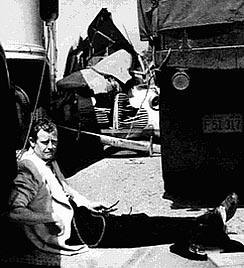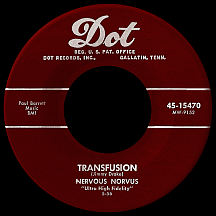NERVOUS NORVUS
Transfusion
Grandma gave young Jimmy Drake a ukulele, little realizing the lifelong career he would make for himself once he learned a few basic chords on the four-stringed Hawaiian instrument. That career, it appears, was spent almost entirely on the fringe of the music industry performing a service (that of producing homemade demonstration records for desperately hopeful singer-songwriter types) surely destined to go largely overlooked and fittingly unappreciated had it not been for a flash of mad genius (or just plain madness) called "Transfusion," a deranged parody of all the car-crash "death songs" that came out before and for several years afterwards. Many felt Jimmy's song advocated reckless driving: 'My foot's on the throttle and it's made of lead...I'm a fast ridin' daddy with a real cool head...I'm-a gonna pass a truck on the hill ahead...' CRASH!!! The easy solution?: 'Slip the blood to me, Bud!'
While working as a truck driver a few years before writing the song that condoned and/or criticized speed demons, Drake hit upon the idea of putting his uke to good use, his basic chord work serving as accompaniment as he sang demo after demo, growing the part time business through ads in industry rag Songwriter's Review ("The Guiding Light to Tin Pan Alley"), where he hawked his wares at seven dollars per finished acetate (or two for eleven); he later claimed to have made over three thousand such recordings, though evidence is lacking as to whether any of them helped establish his hapless clients as pop music composers. Born in 1912 in Memphis, Tennessee, Drake spent much of his childhood in Los Angeles, settling in Oakland, California as an adult, where he became acquainted with Red Blanchard, a radio host on San Francisco's KCBS in the early '50s. Red's comedy skits and crazy voices made him a local celebrity; recording occasionally for Columbia, his best-known song was a 1953 novelty with Paul Weston's orchestra, "Dig That Crazy Mixed-Up Kid."
By 1956 Blanchard had moved his wacky show to KPOP in Los Angeles. Jimmy, who'd been composing his own novelty ditties, sent him a reel-to-reel tape of "Transfusion," which he'd written after some guy in a "twin pipe job" had "come up fast on the right" and "cockeyed nearly cooled me, man" (as recounted by Jimmy in a later Time magazine article). He wanted Red to record the song and make it a hit, but Blanchard liked Jim's voice on the demo and instead overdubbed a razzy-tongued hot rod opening and a repeating car crash effect (with a cartoonish driver/victim squeak that's simultaneously chilling and hilarious) taken from a sound effects record in the radio station's library. But...how could this crudely-devised musical mishmash with lyrics like 'My red corp-suckles are in mass confusion...pump the fluid in me, Louie!,' suggesting recklessness can be fixed every time by a quick-plasma picker-upper, ever gain favor with listeners? Well, those listeners flipped out when Red played the song on his show. So he sold the demo-turned-master to Randy Wood at Dot Records, who recognized its potential to make mounds of moolah!

Drake, who insisted on keeping a low profile, created the pseudonym Nervous Norvus, which perfectly described his attitude about taking the spotlight. The single, released in the spring of 1956, had competition from a quickly-cranked-out pop vocal cover by The Four Jokers on the Diamond label, using the same sound effects, a far less humorous and/or disturbing version that disappeared almost immediately (the exact same effects were used on a version Scat Man Crothers did for the cheapo Tops label and the result is much more effective and appealing, I suppose 'cause Scat Man was and always will be a "cool cat"). Within four weeks of hitting the national charts in June 1956, the Norvus original was a top ten seller (a newcomer by the name of Elvis Presley had just taken slightly longer to reach the same level with "Heartbreak Hotel"). The graphic aspect of "Transfusion" generated enough uneasiness that it was banned by a number of radio stations while TV hesitated to acknowlege it; anyone who did found Nervous Norvus unavailable due to Jimmy's camera-shyness (at one point he refused an offer to appear on The Ed Sullivan Show!), giving credence to his suddenly-famous nickname. Exposure in the pages of Life and Time made his persona less of a mystery while setting the tone that it was all just for fun.
Success guaranteed the farcical creations of Drake's unbalanced mind would continue to reach the public's ears. "Dig" (the flip side of "Transfusion") is a certifiable example ('D-I-G means look...D-I-G means stare...D-I-G means see...D-I-G means glare...D-I-G means use your eyes, so dig, dig, dig, you crazy guys!'). The second single, "Ape Call," claimed the famous Tarzan yell dated back to prehistoric times (originated by 'Young Mighty Joe swingin' through the trees'), explaining it this way: 'All the real cool cats had a solid plan...when they dug a nervous chick they all to a man went...AAAH-EE-YAAAH!!!' (Blanchard voiced the ape yell and received label credit for it). Though even less a correctly structured musical piece than "Transfusion" (N.N. stops midway to explain what a pterodactyl was, in his words '...a stork-lookin' bat with sharp teeth that cruised around...'), it mattered naught; "Ape call, doodly-ah-bah' got inside people's heads and landed in the top 30 in August '56....'Don't be a cube, Rube...go ape!' The summer of Elvis? Nah, it was the summer of Nervous! But just how far could he go with his clearly original/dubiously professional approach to making music? Well...as it turned out, not much further.
Money came rolling in, Jimmy quit his truck driving job, and the screwy tunes kept comin'. "Ape Call" flip "Wild Dogs of Kentucky," essentially a love song to hunting-hounds, is a bit unsettling with its ear-piercing dog yelps and lines like '...their savage howls the devil's blood would freeze.' The third (and final) Dot single paired "The Fang," about a 'zoink-zoink'-speaking Martian who lands on Earth, with "Bullfrog Hop," featuring bogus Red Blanchard group The Smogrollers (he used one of Red's favorite words, 'Zorch,' in this description of a would-be dance craze). He surfaced next under his real name on the As-Is label with "The Orphan's Christmas Song," a total about-face from the novelty records ('I don't want nothin' for Christmas...except just a mommy and dad,' sung with a tear in his eye). Regardless of the type of song, one thing was consistent: Jimmy's trusty ukulele can be heard on everything he did!
He continued recording demonstration discs (orders increased tenfold after he hit the charts) and alternated Norvus records with more straightlaced pop or country material (sometimes using the name Singing Jimmy Drake). His later Nervous Norvus 45s include the mostly-unintelligible caveman-speak "Stoneage Woo," a 1959 release on the Embee label, "Does a Chinese Chicken Have a Pigtail?" ('...a man can hang onto?') on Big Ben in 1960 and "The Lean Green Vegetable Fiend" on Vellez in '62 under his own name, signaling the passing of the Nervous Norvus brand. Drake's career declined sharply as his tendency toward alcohol consumption did him in; he died in 1968 at age 56 (in an interview, Red Blanchard said "His liver fell off"), while his greatest hit lives on. Funny? Shocking? A public service? Yes, to a degree, "Transfusion" is all of these things, the reason, perhaps, it has held up so well throughout the years. The catchphrase 'I'm never-never-never gonna speed again!' may not have been delivered all that sincerely, but the message is there nonetheless.


